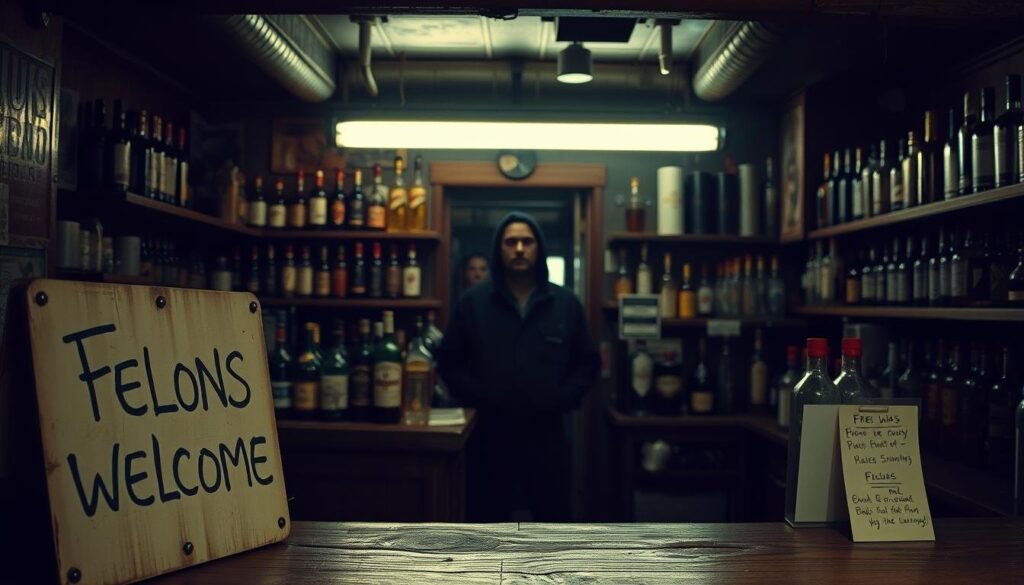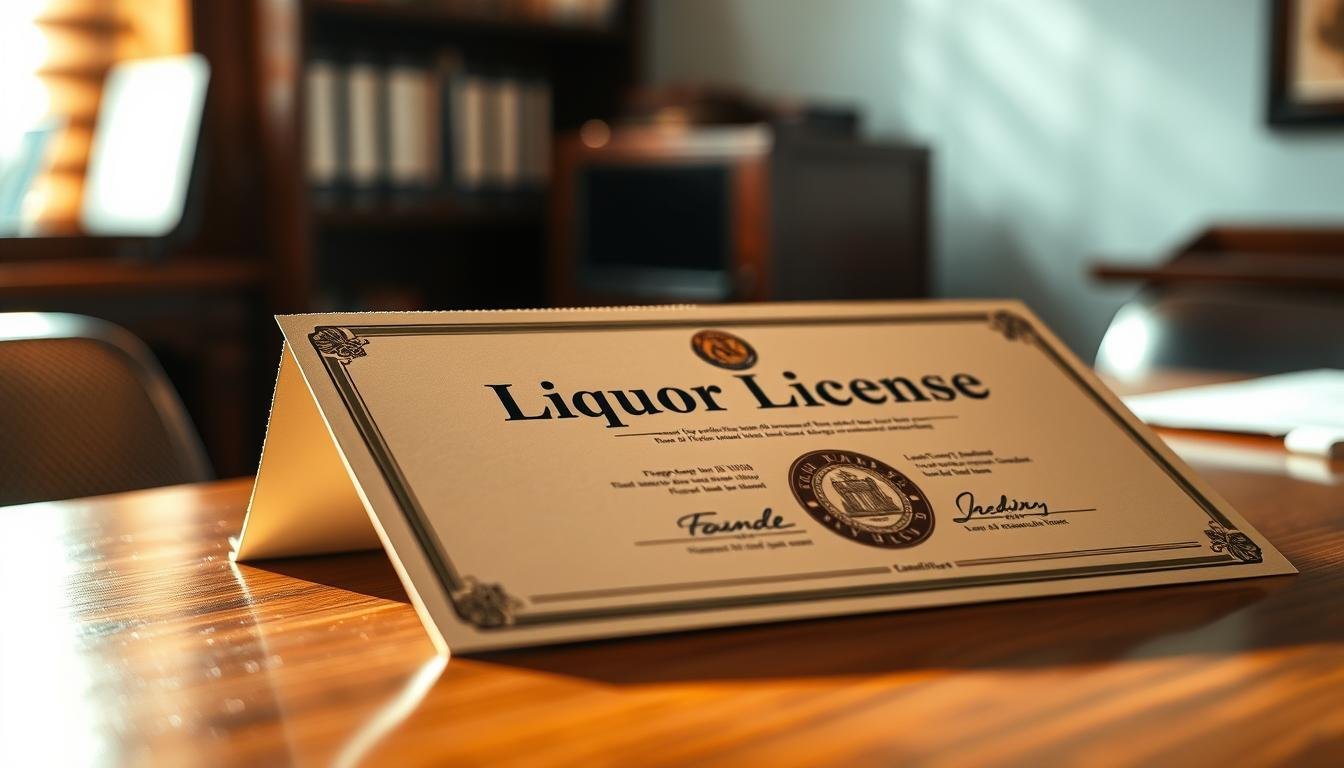Last updated on August 9th, 2025 at 12:49 pm
Can a Felon Get a Liquor License ? If you have a felony record and want a liquor license in Wisconsin, it’s important to know the rules. You need to understand the eligibility and how to apply.
Wisconsin’s liquor laws can be tough, especially for those with felonies. It’s key to grasp how these laws affect you.
Understanding your options is crucial. This article will help you navigate the liquor licensing process in Wisconsin. You’ll learn about the requirements and regulations.
Contents
- 1 Wisconsin Liquor License Overview
- 2 Can a Felon Get a Liquor License in Wisconsin?
- 3 Factors Considered by Licensing Authorities
- 4 The Application Process for Individuals with Criminal Records
- 5 Options for Overcoming Felony Barriers
- 6 Conclusion: Can a Felon Get a Liquor License ?
- 7 FAQ
- 7.1 What are the different types of liquor licenses available in Wisconsin?
- 7.2 How does a felony conviction affect my eligibility for a liquor license in Wisconsin?
- 7.3 What information do I need to disclose when applying for a liquor license with a felony conviction?
- 7.4 Can I get a liquor license if I’ve been pardoned or had my felony conviction expunged?
- 7.5 How long does the liquor license application process typically take in Wisconsin?
- 7.6 What are the grounds for denying a liquor license application in Wisconsin?
- 7.7 Can I appeal a denied liquor license application?
Wisconsin Liquor License Overview
If you want to open a bar, restaurant, or liquor store in Wisconsin, you need to know the liquor license rules. These laws control the sale, making, and sharing of alcohol in the state.
Wisconsin has different liquor licenses for various businesses. These include:
- Class “A” Fermented Malt Beverage License for businesses that brew or sell fermented malt beverages.
- Class “B” Fermented Malt Beverage License for businesses that sell fermented malt beverages for consumption on or off premises.
- “Class A” Liquor License for businesses that sell liquor for consumption off premises.
- “Class B” Liquor License for businesses that sell liquor for consumption on premises.
To get a liquor license, you must meet some requirements. You need to be at least 18, have no tax debts, and not have been convicted of certain crimes. You also have to fill out the right forms and send them to the right place.
The liquor license laws in Wisconsin are enforced by the Wisconsin Department of Revenue. They also handle most license applications. Knowing these laws and how to apply is key for a successful liquor license application.
Can a Felon Get a Liquor License in Wisconsin?
If you’re a felon in Wisconsin wanting a liquor license, knowing the state’s rules is key. The Wisconsin Department of Revenue manages liquor licenses here. They make sure the rules are followed.
For felons, the big question is if their past crimes affect their license chances. Wisconsin doesn’t automatically say no to felons. But, each case is judged differently.

Applying for a liquor license means a deep background check. They look at your criminal history. They think about your crime, how long ago it was, and how you’ve acted since then.
Factors Considered by Licensing Authorities
Wisconsin’s licensing folks look at many things when you apply with a criminal record:
- The nature and severity of the crime
- The time that has passed since the conviction
- Evidence of rehabilitation
- Your character and reputation
To understand how these factors matter, check out this table:
| Factor | Consideration | Impact on Application |
|---|---|---|
| Nature of the Crime | Severity and relevance to liquor licensing | High severity or relevance may negatively impact |
| Time Since Conviction | Length of time since the felony conviction | More time passed may positively impact |
| Evidence of Rehabilitation | Actions taken towards rehabilitation | Strong evidence may positively impact |
Showing you’ve changed and are now law-abiding is crucial. Be open about your past and provide all needed documents. This can help a lot.
For felons, the main thing is to make a strong case. Show why you should get a license, despite your past.
The Application Process for Individuals with Criminal Records
Applying for a liquor license in Wisconsin with a felony conviction is detailed. You need to know the steps and what information is required. This will help you navigate the process successfully.
When you apply, you must give personal details, including your criminal history.Disclosure is crucial. Not telling about a criminal record can lead to your application being denied. The Wisconsin Department of Revenue does deep background checks on all applicants.
The first step is to fill out a detailed application. This includes your criminal history. You’ll need to provide court or police records related to your conviction. Being accurate and thorough is key to avoid delays or denial.
Here are the main steps in the application process:
- Submit a completed liquor license application, ensuring all sections are filled out accurately.
- Provide detailed documentation regarding your criminal history, including any relevant court or police records.
- Pay the required application fee, which varies depending on the type of liquor license you’re applying for.
- Undergo a background check as part of the application review process.
The licensing authority reviews each application individually. They look at the crime, how long ago it happened, and if you’ve rehabilitated.
During the review, the authority might ask for more information or documents. It’s important to answer quickly to avoid delays in your application.
In summary, applying for a liquor license in Wisconsin with a criminal record needs careful preparation and full disclosure. Knowing the application process and providing all needed documents can increase your chances of success.
Options for Overcoming Felony Barriers
You don’t have to let a felony conviction stop you from getting a liquor license. There are several ways to overcome the hurdles a felony conviction presents.
One strategy is to seek a pardon. A pardon is when the government officially forgives a crime. This can help you regain some rights. In Wisconsin, the governor can grant pardons, but it’s a long and competitive process.
Another option is to pursue expungement. Expungement means sealing or erasing your criminal record. This can make it harder for people to see your past. In some cases, it can also help you get a liquor license.
It’s important to know how these actions might affect your liquor license chances. The table below shows how pardons and expungements can impact your eligibility in Wisconsin.
| Action | Effect on Liquor License Eligibility | Wisconsin Statute |
|---|---|---|
| Pardon | May improve eligibility, but not guaranteed | Wis. Stat. § 304.06 |
| Expungement | Can improve eligibility by removing the conviction from public records | Wis. Stat. § 973.015 |
When thinking about these options, it’s key to talk to a lawyer who knows liquor license law. They can guide you on the best steps for your situation. They’ll also help you understand the application process.
Remember, even with a pardon or expungement, the Wisconsin Department of Revenue might still look at your criminal history. This is when they decide on your liquor license application.
Overcoming felony barriers to get a liquor license takes hard work and the right plan. By looking into your options and getting professional advice, you can increase your chances of success.
Conclusion: Can a Felon Get a Liquor License ?
If you’re a felon looking to get a liquor license in Wisconsin, it’s key to know the laws. The state has rules about giving licenses to people with felony records. Several things affect this decision.
The type of felony, how long ago it happened, and your efforts to change are important. A felony doesn’t mean you can’t get a license. But, you should know the challenges and how to face them.
When you apply for a felon liquor license, be honest about your past. Show you’ve worked hard to change. Knowing the application process and what affects your chances helps you make smart choices in Wisconsin.
See Also: Can a Felon Become a Medical Assistant?
FAQ
What are the different types of liquor licenses available in Wisconsin?
Wisconsin has several liquor licenses. These include Class A, Class B, and Class C. There are also special licenses for hotels, restaurants, and clubs.
How does a felony conviction affect my eligibility for a liquor license in Wisconsin?
A felony conviction can affect your liquor license eligibility. The state and local authorities check your character and fitness when they review your application.
What information do I need to disclose when applying for a liquor license with a felony conviction?
You must tell about your felony conviction when applying. You’ll need to provide court records and proof of completing your sentence.
Can I get a liquor license if I’ve been pardoned or had my felony conviction expunged?
A pardon or expungement might help your chances. But, the licensing authority will still review your case carefully.
How long does the liquor license application process typically take in Wisconsin?
The process can take weeks to months. It depends on how complex your application is and the licensing authority’s workload.
What are the grounds for denying a liquor license application in Wisconsin?
The authority might deny your application for several reasons. These include a felony conviction, lying on your application, or other character issues.
Can I appeal a denied liquor license application?
Yes, you can appeal a denied application. You can reach out to the Wisconsin Department of Revenue or local governing bodies.

Van Maldonado, born in California, holds a degree in Criminology and Police Science. Currently serving as an investigative officer at a local police station, he spends his leisure time writing insightful content for FelonScope.com.

